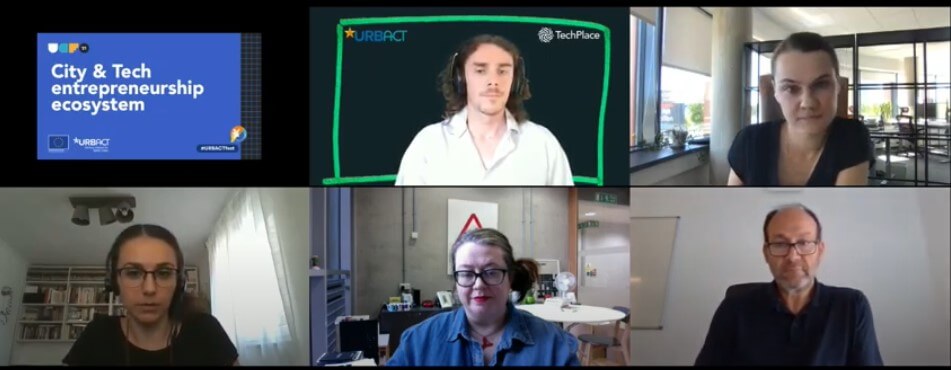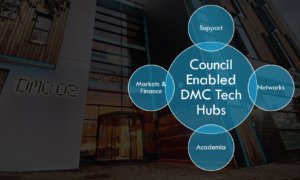How can cities support entrepreneurship development?
Why are ecosystems key to digital entrepreneurship development?
TechPlace explores the public and private sector roles in successful entrepreneurship ecosystems.
Cities, in close partnership with the private and academic sectors, are main enablers and drivers of tech entrepreneurship development as they can create the right conditions for a successful ecosystem growth.

For a business ecosystem to be sustainable it must take into account the local context. Each city and country should focus on developing its own ‘tailor-made’ integrated entrepreneurship ecosystem, in order to create a supportive environment for successful business growth. This was the message at the heart of a 2021 URBACT City Festival session marking the relaunch of TechPlace, an URBACT initiative supporting local, regional and national tech sectors.
What makes a healthy entrepreneurship ecosystem?
Highlighting the need for a more holistic and dynamic approach, Daniel Isenberg (2010) describes the key elements of an entrepreneurship ecosystem:
- A conductive culture,
- Enabling policies and leadership,
- Availability of appropriate finance,
- Quality human capital,
- Venture-friendly markets for products, and
- A range of institutional and infrastructural supports.
Reflecting Isenberg’s model, Tracey Johnson, manager of Barnsley Digital Media Centre, lead partner in the URBACT Tech Revolution network, describes her organisation as a “council-enabled tech hub – sitting in between the private and public sector”.
“I see a provision of support as a key to success. We listen to entrepreneurs, engage with them and try to respond with the right support that is focused on them,” says Tracey. “Our superpowers are our networking skills – we are able to connect entrepreneurs with the right people, the right expertise, right conversations, and right opportunities. We don’t focus only on local connections, but on regional national and mostly on international ones”.

Representatives of Mataro, Spanish partner in the recently completed URBACT BluAct network, also see their local digital entrepreneurship benefiting from a balance of public and private sector support.
The City of Mataro, located about 30 km from Barcelona, is a great example of resilience. It has a long history in the textile industry, and saw substantial changes to its economic model in the 1990s. In answer to the challenges of digital transition and digital transformation of local industry, the city created an impressive new digital ecosystem. Throughout this process, one of the main instruments was TecnoCampus, a Mataro city council initiative that merges both academia and business activities.
“We are not just a place where academia meets businesses, we are a technology park that hosts 120 companies, three University schools and three incubators – a Business incubator, an accelerator and an R+D Centre,” explains Josep Lluis Checa, general manager of TecnoCampus. TecnoCampus is Mataro’s key asset in fighting the challenges of being within the Barcelona congregation, while also attracting businesses and activity within the local area.

While developing a local entrepreneurship ecosystem, Mataro is applying a so-called ‘quadruple helix model’ where they connect academia, administration, local community and enterprises.
Tallinn, Estonia is an example of how a tech entrepreneurship ecosystem can be initiated through the public sector and, once the foundations are in place, how a city can develop a really strong partnership with the private sector and academia. In recent years, Tallinn has taken part in various URBACT networks promoting integrated urban development.

Fyma, a computer vision AI company, was only a start-up when Tallin decided to take an innovative approach and introduce artificial intelligence in traffic data collection. Being a relatively small country, Estonia often perceives itself as a test-bed allowing its local start-ups and private sector to use the available data for their development and innovative solutions. Karen Burns, CEO and Co-founder of Fyma, which has now expanded in both Estonia and the UK, thinks that Estonia’s early IT infrastructure projects in the educational system, launched in the 1990s, have facilitated tech entrepreneurship ecosystem growth in a significant way. This has resulted in national talent resources that support Estonia’s tech growth and its economic resilience.
Cities creating the right conditions for digital growth
Agreeing that cities can enable and drive the development of a tech core system, Tracey Johnson stresses that cities have a very important role in creating the right conditions for a successful ecosystem – the right support, the right culture, the right policy, the right governance, access to talent, access to finance, spaces and places, as well as access to markets. But Tracey also claims that the importance lies with the right attitude, and recognising that a city is only one of many stakeholders in a process that is organic and cannot be controlled from the top down. On the other hand, cities can help with establishing mechanisms like co-investment funds where the public and private sectors share the risk of supporting new innovative companies. Finally, cities need to listen to the private sector and be prepared to do things differently.
Having the right talent at local, regional, and national levels has been a priority throughout the EU. And Mataro is no exception. According to Joseph Lluis Checa, the city wants not only to create its own local talent, but also to be able to capture talent from all over the world. Economic value from the right knowledge is imperious. In order to reach this goal, Karen Burns feels that cities need to become more accessible. They need to focus more on the factors that impact quality of life in order to attract talent. Is the public space infrastructure appealing? Does the city have bike lanes that the community can use while travelling to work? Is the city family-friendly? These are just a few of the many aspects of attractiveness that cannot be driven by the private sector but can make a great difference to the development of talent capture initiatives.
Governments should focus on building the legal and institutional basis for supporting bottom-up efforts from entrepreneurs, while the private sector should provide precious input into the design of these policies. City engagement and close communication with the business community could help shape an entrepreneurship ecosystem that is uniquely tailored to local needs and circumstances.
Join the TechPlace community!
Based on their 2021 research into capacity building needs, TechPlace supports city practitioners working on urban digital transformation, through events, meet-up workshops, knowledge sharing, and a Slack platform promoting community engagement. As Ian Graham, URBACT Expert and TechPlace team member explains, TechPlace is not only for tech savvies from city IT departments, it is a community for anyone who is actively trying to grow their local, regional or national tech sector. It is a safe space for public sector employees of cities and regions; for anyone building their own businesses or wanting to be part of a tech growth agenda; as well as for educators and researchers driving new tech knowledge.
Further information:
- Watch the Festival session on TechPlace Reloaded – join the community!
- Watch the Festival session on Tech in the City – force for good or evil?
- Read on Entrepreneurship Ecosystems
- Read on TechRevolution good practice
- Read on Transfer story from Mataro, Spain
- Take a look at a practical guide to starting a Tech Revolution

